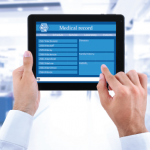
“If you don’t document it, it didn’t happen.” How many times have we all heard this in a conversation or committee meeting, or seen it a memo?
Certainly, this is wise advice, especially in an era when reimbursement depends on the demonstration that a host of items have been performed in the clinical setting: history and physical, review of systems, review of records, complex decision making, and so on. In the realm of education, documentation also abounds and includes needs assessments, written goals and objectives, and disclosure statements, among others.
To meet the requirements for documentation, institutions have acquired computer systems that far exceed in power those that got Apollo 7 to the moon. No doubt about it, modern medicine is equipped to document.
I have a question that is somewhat different. “If you document it, did it happen?”
I am not talking about fraudulently billing for services. I am talking about the real world and the extent to which honest and conscientious people deliver care in the spirit and not just the letter of the law.
Documenting in Action
I began to ask this question while visiting my mother in the hospital. This was a fine, well-established community hospital. Indeed, in the elevator, there was a sign indicating that this hospital was the only one in the area that was ranked in the top 100 by some rating service. I have no idea how this assessment was made, but it is reassuring to know that a loved one is in the hands of good people.
When I was not with my mother, I paced around the ward, which had an old-fashioned nursing station where scores of people were charting, scribbling notes, or clacking at computer keyboards. From the intensity of their activity, they appeared to be documenting up a storm.
On the other hand, there appeared to be only a few people actually with patients, and those who were seemed variously frazzled or frenzied. I watched one nurse in the middle of her 13-hour shift speed around the ward with the moves of Barry Sanders in his prime days with the Detroit Lions. In her white Adidas sneakers, the nurse dodged right near a med cart, broke left past an old man drooling in a wheel chair, and then did a quick scamper down the hall, cutting sharply to enter a patient room. Carmen was her name and she was clearly a great nurse, the kind you love to work with when you are a house officer, especially in the ER.


